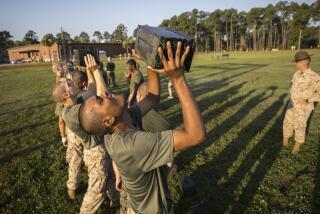Marines Offer Aid for Information
- Share via
CENTRAL IRAQ — In the middle of the main street of a desperately poor town, Marine Capt. Aaron Robertson on Sunday offered the curious crowd a deal: Help us root out President Saddam Hussein’s hit squads, and the United States will bring you electricity, clean water, food and medical care.
“I’m a man of my word,” Robertson told a skeptical town leader as the crowd pressed forward. “From God’s mouth to mine: We are here to help you. We won’t leave you stranded.”
Marines began moving into towns and villages Sunday and, in a new attempt to win over the people, pledged needed aid if Iraqis identify members of paramilitary groups that have harassed and ambushed U.S. forces.
“Our goal is to win their hearts and minds and let them know we’re here to protect them,” said Lt. Col. Geff Cooper, a San Bernardino County sheriff’s deputy and commander of a reserve infantry battalion. “We’re not just going to blow through town and then leave them to the Baath Party.”
Cooper’s troops descended on the rocky, litter-strewn streets of the town Saturday, encircled the ruling Baath Party headquarters and took dozens of loyalists prisoner.
Several hundred weapons -- including many Chinese- and Russian-made assault rifles -- were seized and dumped into the nearby river.
As Cooper’s caravan, protected by U.S. Marines with .50-caliber machine guns, rolled down the street Sunday, residents shouted out their needs. Children and adults flocked into the street through doors set in cracked and crumbling adobe buildings.
“We have children and babies here, but no doctors. We need help,” one man said. Many began shouting the Arabic word for electricity. Hussein’s retreating forces had disabled the power plant, leaving the town with no lights or water.
“We need our lights. When it is dark there are many thieves, and we have no security,” pleaded one man, who identified himself as a teacher but was afraid to give his name.
Robertson, an intelligence officer, pledged that the electricity would be restored and that doctors, nurses and dentists would be arriving soon. In exchange, he said, “we need your help in removing the people who have been hurting you.”
As the mostly youthful crowd shouted support, several older men, speaking to Robertson through a Marine interpreter, an Iraqi American enlisted man, offered to provide information and were taken away.
Like many places in this agricultural belt, this town of roughly 20,000 has suffered. From its looks -- pools of fetid water, garbage in alleys and large numbers of dirty, raggedly dressed children -- the Baghdad government has done little. For security purposes, the Marine Corps asked journalists not to identify the town.
There also have been widespread reports that Hussein loyalists have forced rural villagers to act as human shields, as decoys or as paramilitary troops in attacks on U.S. troops. Some reportedly have been told their families will be killed if they do not cooperate.
For Cooper’s troops, the humanitarian mission was a switch from their recent experience fighting through multiple ambushes in the Euphrates River town of Nasiriyah. The battalion is staffed by reservists, many of whom hold law enforcement jobs in civilian life.
“It was kind of like patrolling parts of L.A.,” Staff Sgt. Robert DeArnon, a Los Angeles police officer, said of the battle through Nasiriyah. “Except in L.A., gangsters take a few shots at you with .45s and then run. Here it was with RPGs” -- rocket-propelled grenades.
Later, Brig. Gen. John Kelly, assistant commander of the 1st Marine Division, said the humanitarian effort is a natural progression from the battle to oust Hussein and to kill or capture the paramilitary groups supporting his regime.
“Part of the process of seeking out the enemy -- in this case, these regime death squads -- is going to be going into the villages and, while we’re there, asking, ‘What do you need?’ ” he said. “It’s a people thing.”
Kelly said the tactic seems to be working, although many Iraqis are leery that the United States will leave as soon as Hussein is toppled. “People are beginning to rat them out,” he said. Some Iraqis remain disappointed that the U.S. did not remove Hussein in 1991 after forcing the Iraqi army out of Kuwait.
Talking through an interpreter, an unemployed car mechanic said the townspeople “feel caught between the U.S. and Saddam.”
“The people feel helpless,” he said. “They can’t face the U.S., and they can’t face the regime. They can’t have full trust in the U.S. because of Desert Storm.”
To help break down the sense of helplessness, the Marine Corps has teams of civil-affairs specialists that will remain after the combat troops have resumed their drive to Baghdad. Using leaflets and loudspeakers, they will enter towns to spread the message that the United States is not interested only in removing Hussein.
Maj. Paul Konopka, a civil affairs officer, said Marines have begun handing out food to Iraqis, including candy to children, in an effort to break down the barrier of suspicion. “It will take a lot to get the adults to trust us after 1991,” he said.
Although the Marines pledged assistance, they made it clear that their direct involvement would be limited. Kelly said he expected the United Nations and private humanitarian groups to take over once Hussein is removed.
“We’re warriors,” Cooper said. “We’re not the Red Cross or UNICEF. We’ll feed people, but we’re definitely not going to get involved in another Somalia.”
More to Read
Sign up for Essential California
The most important California stories and recommendations in your inbox every morning.
You may occasionally receive promotional content from the Los Angeles Times.










